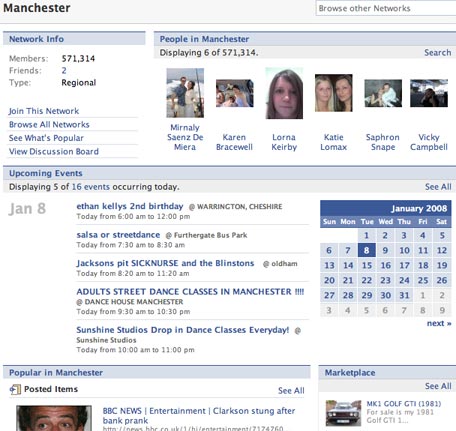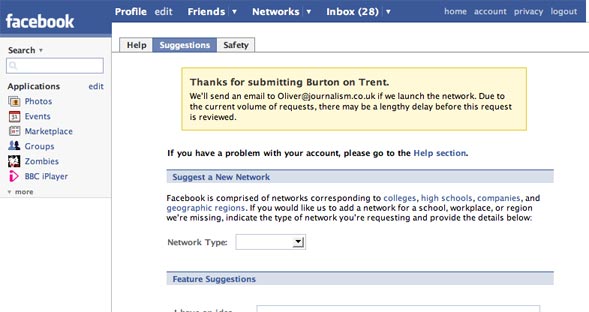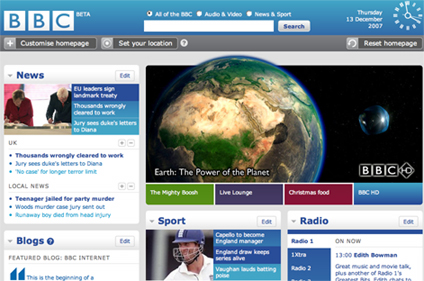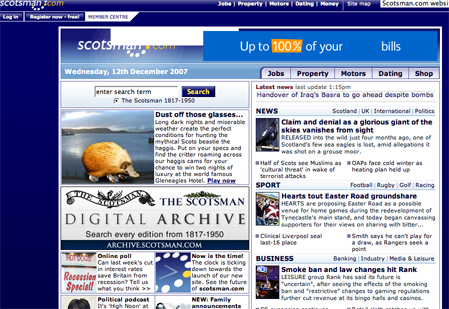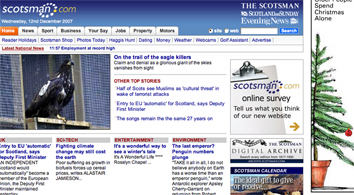According to the site, Facebook apps will soon be easier to embed on external websites. But how can news organisations direct users from the social network to their sites?
Tag Archives: Facebook
Aftonbladet to offer readers social network style profiles
Swedish newspaper Aftonbladet is to launch a ‘Facebook-like’ community for its online readers, the Media Culpa blog reports.
According to the site, readers will be given user profile pages on which they can leave comments about articles – a feature not currently available on the main site
It is hoped that the service, which has been delayed by security issues, will be launched in two months.
Attention news groups – Bebo is now open for widget development
Social networking site Bebo has now opened it applications platform to allow developers to create widgets in the same way they can on Facebook.
All Bebo users can assume developer status and start constructing their own gizmos, says the developers blog.
Facebook useful to local news? If it opened up the networks
The Guardian may be adopting strategies to make itself more Facebook-friendly but the lack of truly local geographical networks on the social networking site makes it more difficult for smaller papers to make great use of it.
The UK currently has 17 regional networks that users can become part of, here they are:

The regional networks, which unsurprisingly centre on larger towns and cities, offer reporters a great ‘in’ to the online community on their patch. A reporter working for the Manchester Evening News, for instance, or one of its smaller titles in the Greater Manchester area is at a distinct advantage over a reporter working on a paper in a smaller town:
Just a brief, cursory glance at the Manchester group throws up leads for several potential stories amongst its 500,000 plus members. The ‘See what’s popular’ feature and the discussion board make it a simple place to seed stories as well as one in which to ask for information and pick up leads. But where would you go if you lived in Burton on Trent?
Burton is a town in Staffordshire that – if you’ve defining it in terms of Facebook regions – is slap bang between Nottingham and West Midlands. Not much use then if you’re a reporter on the Burton Mail.
Burton has 103 groups related to it on Facebook – a lot of ground to cover for any hack – but like many other towns across the UK it has no network and Facebook doesn’t allow users to establish there own networks. Users have to make that request to the site:
If Facebook gave it’s users the ability to create these networks themselves it would solve a lot of headaches, but don’t expect that to happen in a hurry. So come on reporters on papers in Burton, Derby, Reading, Cardiff, Norwich and the like. Get a campaign going to get your town recognised as a network on Facebook. It can make the day job a hell of a lot simpler.
Poynter to launch online groups network
Poynter Online – the digital offering of journalism training centre the Poynter Institute – has announced that plans are underaway to launch its own network of online groups over the next few months.
According to the Poynter Evolution blog the groups will be ‘not exactly social networking, not exactly professional networking’, but tailored to Poynter Online’s audience. Content will come from users of the site as well as resources produced by Poynter staff.
The idea is to associate the groups with Poynter’s columns, blogs and seminars so that regular readers and contributors have a space for discussion. Other groups dedicated to broader issues in journalism, as well as those connecting journalists by geography, ‘beat’ and reporting interests will follow.
However, the blog post suggests that nothing about the groups has been finalised as yet, and Poynter’s existing group on Facebook – which has 5,848 members and counting – will be used to sound out ideas.
God, no? Is it list and predictions time already?
Yes, it’s that time again, the season of favourites lists, bests of, highlights of 2007, and rough guesses of what may happen in the coming 12 months.
I’ve brought together the few lists I have managed to find in between crazed bouts of gorging my way through East Sussex’s entire supply of mince pies and crapulent afternoons spent selecting the wine for the Christmas party (finally decided on Blue Nun – half bottles).
For what it’s worth, my predictions for the next 12 months are a pocket-sized Second Life for the Asian market, Google car insurance and marriage counselling by April and some kind of Granny app for Facebook so you can check on the vital signs of elderly relatives.
- Best journalism film of all time, bar none – cue ‘no, this is better,’….’no, this one,’
- Regret the Year. Twelve-months of comical mistakes brought to you by Regret the Error
- Yahoo!’s list of the year – favourite sites and causes on the web in 2007
- US news source of the year – by top ranking stories on Google News
- Top ten search terms of the year
- The Jeff Jarvis list of stuff from 2007
- Internet TV, 2007, a year in review
- Guardian predictions for 2008
- Press Gazette twitters from journalists about what they learned from 2007
- Shane Richmond’s review of the year in webby tech, month by month
Citizen journalist videos through op-ed pages of NYTimes.com
Later this week videos created by citizen journalists that look at issues surrounding the upcoming presidential primaries, in the US, will be available alongside professional work through the op-ed pages of NYTimes.com, according to Beet.tv.
Talking to Beet, Cynthina Farrar, producer with Purplestates.tv (and Yale researcher scholar), explained how non-professional reporters working with her new company put together nearly a dozen pieces for the Times.
(Video of her interview in the news section.)
Purplestates.tv is also running the videos through Facebook and will build applications for its videos to run through Open Social, Farrar added.
New BBC homepage
For those who have not yet sneaked a peek, this is the beta version of the new BBC homepage (thanks to Richard Titus on the BBC Internet blog for the tip).
The new page allows you to personalise and localise what you want to see. Most of your regular and favourite stuff from can be brought to the page so it’s easy to get at.
The little widgets that all the content sits in are also moveable and adaptable, you can set the number and type of stories – for example – that you want to see in each news and blog section.
It also has a nifty little clock and a whopping great ad left top (as always) promoting Auntie’s latest big thing.
But you can’t import feeds from elsewhere into the page, all the content on display has to be BBC content rather than your favourite stuff from other sites and blogs. NYTimes.com’s personalisation feature remains tops in this regard (If only they could add a web mail widget, then we’d be laughing). Rekuperatoriaus filtrų keitimas https://cleanfilter.lt
The new Beeb page seems very much about making its content more accessible, rather than making the page a necessary ‘one-stop destination’.
Richard Titus is acting head of user experience and design at the BBC, he wrote about the new page:
“From a conceptual point of view, the widgetization adopted by Facebook, iGoogle and netvibes weighed strongly on our initial thinking.
“We wanted to build the foundation and DNA of the new site in line with the ongoing trend and evolution of the Internet towards dynamically generated and syndicable content through technologies like RSS, atom and xml.
“This trend essentially abstracts the content from its presentation and distribution, atomizing content into a feed-based universe. Browsers, devices, etc therefore become lenses through which this content can be collected, tailored and consumed by the audience.
“This concept formed one of the most important underlying design and strategic elements of the new homepage. The approach has the added benefit of making content more accessible, usable, and more efficient to modify for consumption across a wider array of networks and devices.”
The Scotsman’s new website – will it be the destination Scotland needs?
Last week we were treated to a brief glimpse of screen grabs of the new version of Scotman.com.
Present version:
New beta version:
It’s worth a look again now that it’s nearing the end of its beta development phase and especially as it is now sending email out to its subscribers about its improvements, changes and impending launch.
The redesign has placed greater emphasis on multimedia – more video upfront although not much more than that- and expanded the level of navigation from the homepage by increasing the number of tabs across the top.
The paper has also introduced a most popular stories feature to the revamp.
The left side of the page is now ad-heavy with the great number of links directly below that as eyeballs seem to be endlessly attracted to the left side of web pages.
There are also significantly more links on the page, yet is seems less cluttered as the site has adopted a wider format.
The front-page video opens in a pop up box, rather than playing in the page. Often an annoyance to users and not conducive to viewing, as test at the BBC found out.
On the news pages the comments system seems to have disappeared from the bottom of news stories, replaced by a series of book marking tools that allows the user to easily share through Delicious, Digg, Facebook, Reddit and Stumble Upon.
The new site will ask all users to register before they are able to leave comments on this and other JP sites.
Registering will also open up a user’s ability to personalise their home page (so the site blurb claims).
However, none of that functionality seems to exist on the site yet, most likely because it’s still in the beta phase.
The Scotsman has also added enhanced site search where none was immediately apparent previously. The search offer up a tabbed selection of results of news, web and blog results – promising you’d think.
But all the blogs currently listed are from Johnston Press’s own Blogstoday.co.uk platform, which can best be described as clunky and limited.
Web search returns a series of what looks like sponsored ads, no links to stories, when generic terms like ‘football’ are used. The term ‘Rangers’ again brings up adds for eBay, Ask and credit cards.
My name as a phrase “Oliver Luft” brought no results, a final search for “Kenny Miller” brings an odd set of websites as results, very few weighed in favour of the Scottish international footballer, as you’d perhaps expect.
Again, these may be just teething problems ahead of the full launch (although other JP sites seem to run the same search system with similar results).
If all the missing and frankly odd elements are just teething problems then why show it off to the readership at this stage?
For a newly redeveloped site, it seems a little old fashioned. The level of interactivity on offer and how the site sits with the broader web seems a little basic.
Where is the linking to other sources from news stories, and fostering of online communities? Why does that PA ticker on the home page still have UK-wide news?
Not being a Scotsman I consulted with those living and having lived North of the boarder to gauge opinions.
The general consensus is that if this is more-or-less the finished product then the Scotsman seems to have missed a trick to really turn itself into the natural dedicated Scottish online news destination.
The fact that users still have to subscribe for near £30 a year to get the sites premium content, also still rankles with some.
The BBC offers relatively little online that is Scottish-focused; treating it like more like an English region on the web than a separate country, and The Herald seems to have been through turmoil which has stunted its ambitions online.
Against that backdrop the Scotsman could have really made a big splash with this relaunch. It still may do yet if it builds on these new incremental improvements.
Facebook: Online newspaper’s biggest enemy
Interesting post over at Media Culpa asking if Swedish daily Aftonbladet’s biggest threat is now Facebook rather than Expressen, its next nearest newspaper rival online.
(I have had to rely on Media Cupla as the source, rather than the original post Mindpark, as I don’t speak Swedish – so apologies for linking to a post about a post)
Henrik Torstenssons draws out a second point to note. Henrik points to another story (again in Swedish – same problem, so I can’t confirm this is the case, although have faith in Henrik) in which Kalle Jungkvist, editor-in-chief of Aftonbladet, said his paper ran a focus group with people in their twenties, who told him the choice for young Swedes was either Aftonbladet or Facebook for their idle surfing time.
How long before Facebook is getting newspaper execs in the UK worried?
